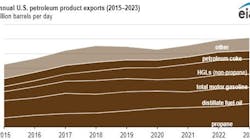Ann de Rouffignac
OGJ Online
California Gov. Gray Davis denounced the Federal Energy Regulatory Commission Thursday for not ordering consumer refunds for high-priced electricity and for ordering changes to the California Independent System Operator and California Power Exchange boards.
Davis's remarks were made in video testimony at a public hearing on a FERC-proposed order to reform the California wholesale power markets.
Davis said he was �perplexed� that FERC did not order refunds, even though the federal overseer of the bulk power marketers found that electricity prices charged California consumers last summer were �unjust and unreasonable.�
He inveighed against FERC for stripping California of its ability to protect its own consumers. FERC recently denied the California ISO the ability to impose rate caps.
�You are asking us to knuckle under for the next 10 years, to weaken our economy, and put consumers at risk,� he said.
He noted the FERC investigation of the California power market, conducted at the request of Gray and California utilities, recognized state markets are not competitive and that electricity prices are too high.
�But you are not willing to do anything about it,� he complained.
In areas where FERC called for action, Davis wants the commission to stay out. In the proposed order, FERC said the stakeholder boards of the California ISO and the California PX must be disbanded and changed to be totally independent.
Hands off boards
An outraged Davis admitted there is conflict on the boards of the two organizations. But he was clear that the board composition and structure are the state�s problem to fix and not FERC�s.
�It is California that has the jurisdiction to determine these boards and the structure of the boards,� he said.
Other state officials reiterated Davis� remarks about the refunds and went a step further warning electricity suppliers could be subject to reregulation.
�If something isn�t done about the high prices, people will respond by reregulating electricity,� said Debra Bowen, chairwoman of the California Senate Committee on Energy, Utilities, and Communications.
Bowen said high electricity prices may drag the state into a recession.
�FERC is proposing solutions that rely on the market to solve the problem,� she said. �We must go away from that for the next several years if we want to avert a full return to regulation.�
Dianne Jacob, chairwoman of the San Diego County Board of Supervisors, agreed FERC should pursue the idea of retroactive refunds. She called upon the agency to initiate an investigation into the refunds as soon as possible.
�What�s occurring in San Diego is white collar crime and no less,� she said.
Jacob wanted FERC to continue investigating market power abuse, even though the FERC staff concluded after an extensive 3-month investigation that none was exercised.
John Stout, senior vice-president Reliant Energy Wholesale Group, also wants FERC to investigate market behavior in order to clarify once and for all the issue of market power abuse.
But Stout wants the buy side of the market looked at in conjunction with the supply side.
Stout analyzed California Power Exchange prices on 1 day last summer, compared with the same day the summer before. On June 29, 1999, average electricity prices were $50/Mw-hr. One year later the average had jumped to $500/Mw-hr.
The data obtained from the PX showed sellers offered the same bid curves for various hours of the day. In other words, they offered about the same amount of power for sale no matter what time of day it was. Seller behavior was the same for both years. But buyers behaved differently.
The market price for June 29, 2000, was $175/Mw-hr at 9 a.m., and by 1 p.m. it was $750/Mw-hr. Stout explains that the escalating market price can be explained by the bids of the buyers. Each hour of the day, buyers bid higher and higher prices to obtain power. The pricing pattern is consistent with competition among buyers� not lack of competition among suppliers, he said.
Stout asked the commission to look at buyer bid behavior to determine what happened to market clearing prices last summer.
�The bid curves for June clearly show this same pattern of buyer pricing repeating day after day," Stout said. "Sellers bid almost identical offers hour after hour, but buyers competing aggressively against one another caused prices to jump 300% to 500% on a daily basis.�
Instead of suppliers exercising market power yielding unjust and unreasonable prices, Stout suggested high prices resulted from the bid behavior of buyers.
